Assembled here are key sources that have shaped the modern Middle East, Zionism and Israel. We have included items that give texture, perspective and opinion to historical context. Many of these sources are mentioned in the Era summaries and contain explanatory introductions.
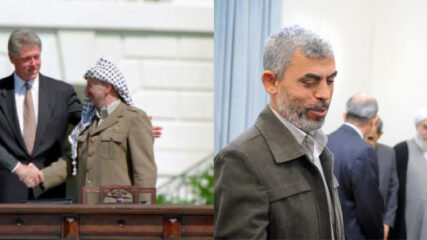
For more than a century, Arab and Muslim leaders have expressed hatred for Jews, Zionism and Israel, although some have pointed internally for the failures of the Palestinian Arab national movement.
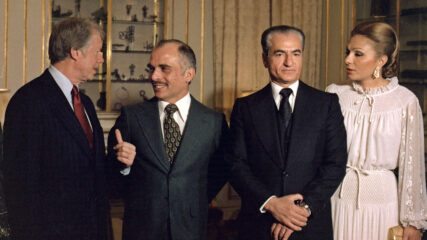
Having made human rights a central pillar of his foreign policy, Carter nonetheless seemingly ignored the abuses the Shah of Iran imposed upon his own people. Carter’s unctuous praise for the Shah at this state dinner angered Iranians in general, the clerical regime that replaced the Shah in 1979, resulting in negative consequences for Carter as he went into the 1980 presidential election.
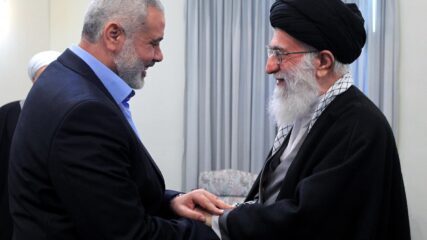
Hamas leader Ismail Haniyeh says in Tehran, “We shall never recognize the usurper Zionism government” and will “continue the jihadist movement until the liberation of Jerusalem.”
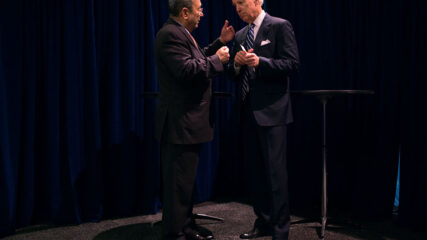
Biden’s is seized by Iran’s nuclear weapons program, and its continued support of terrorist organizations, like Hezbollah and Hamas; they endanger Israel and the world. Golda Meir told him. “Israel’s secret weapon; it has no place to go.”

Netanyahu praises the Obama administration for its support of Israel’s security, then roundly criticizes it for negotiating a deal with Iran that will not roll back its nuclear breakout time and for not demanding that before sanctions are lifted that Iran stop its support of terrorism and threats to wipe Israel off the map.
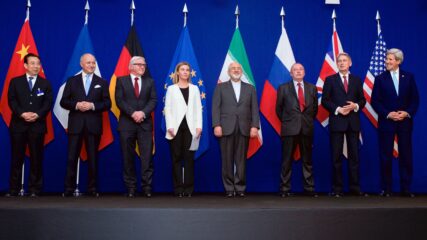
Under the deal between Iran and five world powers, Iran agreed to dismantle much of its nuclear program in exchange for billions of dollars of sanctions relief. Israel called the deal too lenient. On May 8, 2018, President Trump withdrew the U.S. from the JCPOA, calling it one of the “worst and most one-sided” agreements in U.S. history. Israel’s objectives in attacking Iran in June 2025 focused on the same central features Israel argued a decade earlier were not sufficiently addressed in the JCPOA.
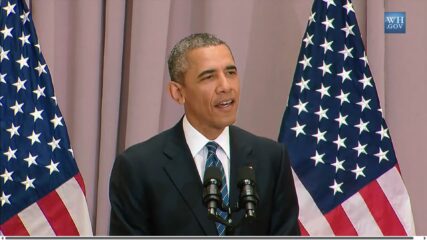
Vigorously promoting this Iran Deal as a viable way to block and limit Iran pathways to a bomb. While recognizing Israel’s intense trepidation to the deal, he forcefully claims that war remains the only alternative to accepting this agreement, or to any changes to the agreement.

Netanyahu reproaches the international community for supporting the Iran deal, the UN for its deafening silence against threats to Israel, and, against Palestinian leader Mahmoud Abbas for promising to cancel all agreements with Israel.

Kerry states five major objectives for US foreign policy in the Middle East: mobilize partners to defeat ISIS, work diplomatically to end the civil war in Syria, keep it from destabilizing friendly nearby countries, monitor Iranian adherence to the nuclear deal, and seek a two-state solution to the Palestinian-Israeli conflict.

With reams of evidence secured by Israeli intelligence, the PM calls out Iran for lying about their nuclear activities both before and since signing the 2015 JCPOA nuclear agreement with six countries.
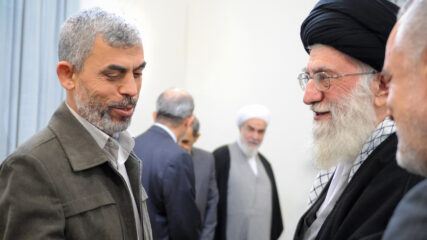
Yahya Sinwar, the Hamas leader in Gaza and mastermind of the October 7 attack, repeatedly expressed his desire to destroy Israel and his gratitude for Iran’s support.
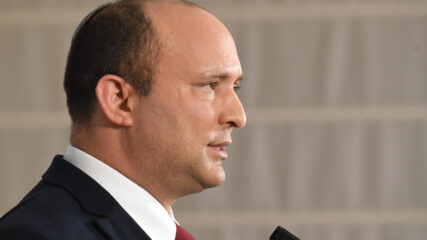
Bennett makes remarks about a new self-defense system, fears about Iran, managing the pandemic, economic growth, and Israel’s growing relationship with Middle Eastern Arab countries.
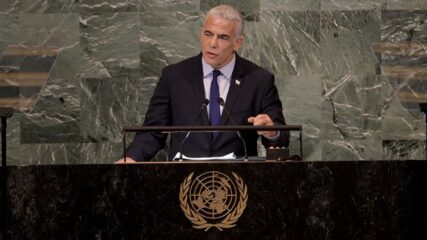
The focus of Prime Minister Yair Lapid’s first speech at the UN was a political weather report of Israel’s relations with Arab neighbors. He lauded Arab states for embracing Israel, hoped that Israel could move toward a two-state solution with the Palestinians, and blistered the hate spewing from Hamas and Iran; Israel he said, would not tolerate Iran obtaining a nuclear weapon.
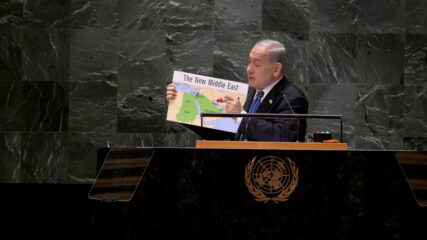
Addressing Israel’s fear of Iran’s access to nuclear weapons, the same point made by his predecessor Yair Lapid stressed in 2022 at the UN, Netanyahu like Lapid praised the Abraham Accords, noting in a quite unrestrained fashion that Israel was on the ‘cusp of a historic peace with Saudi Arabia.” The Prime Minister did mention support for a two-state solution with the Palestinians as Lapid had done previously.
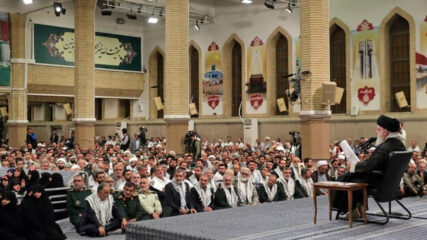
Iranian Supreme Leader Ayatollah Ali Khamenei delivers a synopsis of Iran’s hatred of Israel and the United States, provides deep insight into his unwavering commitment to destroying Israel, and mourns for slain Hezbollah leader Hassan Nasrallah.
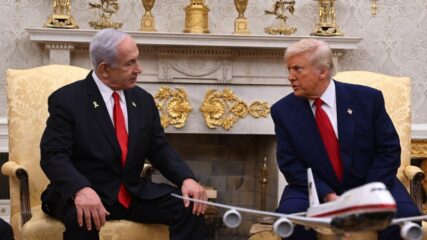
Benjamin Netanyahu makes his second White House visit of Donald Trump’s second term, but the discussion this time expands beyond Gaza and regional peace to include bilateral trade after a Trump announcement of new tariffs on Israeli goods.
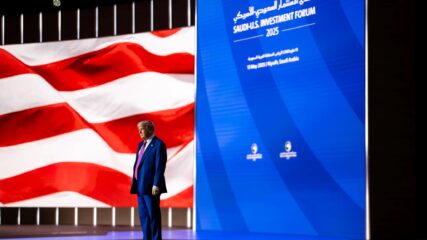
May 13, 2025 President Donald Trump’s address laying out a vision for Middle East peace and prosperity and ending sanctions on Syria at the 2025 Saudi-U.S. Investment Forum in Riyadh, Saudi Arabia, https://www.youtube.com/live/wj1QOz3iuCE?si=qQRR2GcqZhtt1F5o Well, thank…
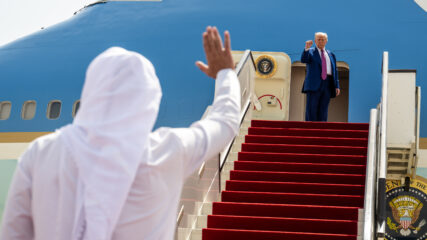
Visiting Qatar after Saudi Arabia and before the United Arab Emirates in a Middle East trip that excluded Israel, President Donald Trump praises and pledges to defend Qatar and indicates a deal on Iran’s nuclear program is close.
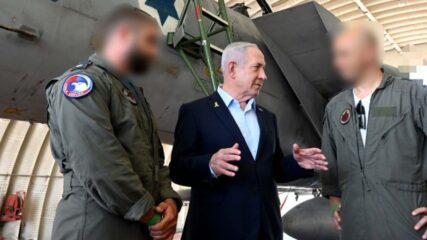
Speaking in English, Prime Minister Benjamin Netanyahu announces Israel’s airstrikes on Iran, targeting nuclear enrichment, nuclear weaponization, nuclear scientists, the Natanz nuclear facility and ballistic missile infrastructure. Netanyahu says the attack is for the world, not just for Israel.
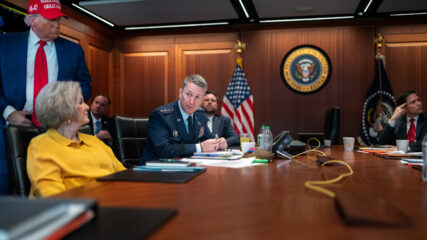
President Trump announces precision U.S. airstrikes on Iran’s key nuclear sites, citing Iran’s four-decade-long hatred of the U.S. and killing of Americans and others. He thanks the U.S. military, the Israeli military and Prime Minister Netanyahu, warning Iran to pursue peace because more targets remain.
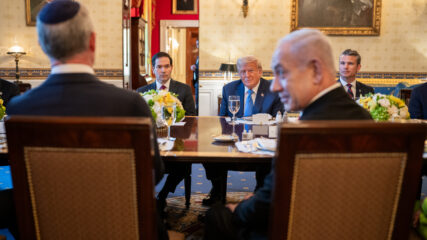
Before a White House dinner, President Trump and Prime Minister Benjamin Netanyahu talk about Gaza, Iran, Syria and Middle East peace.




















